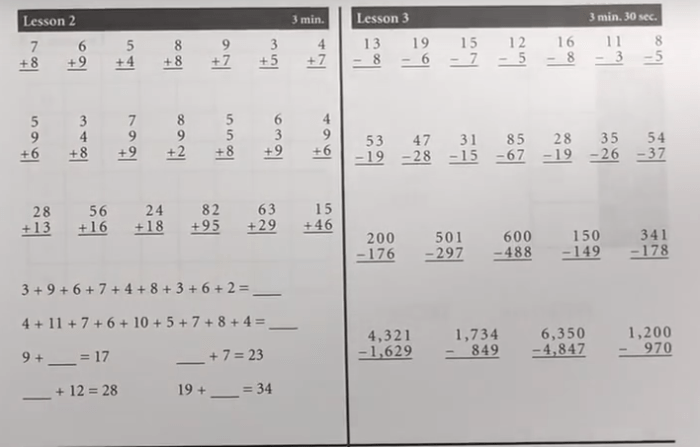Embark on an enlightening journey into Abeka Business Math Quiz 5, a comprehensive assessment designed to equip you with the essential math skills for navigating the complexities of modern business. This quiz not only tests your knowledge but also empowers you with practical applications that will prove invaluable in your future career.
Delving into the quiz’s structure, you’ll encounter a range of question types that challenge your understanding of key concepts such as financial analysis, data interpretation, and problem-solving. By mastering these concepts, you’ll gain a solid foundation for making informed business decisions.
Introduction to Abeka Business Math Quiz 5
Abeka Business Math Quiz 5 assesses students’ understanding of fundamental business math concepts and their ability to apply these concepts in practical business scenarios.
This quiz is designed for high school students studying business math and aims to evaluate their progress and identify areas for further improvement.
Quiz Format and Structure
Abeka Business Math Quiz 5 consists of multiple-choice questions that cover a range of topics, including:
- Calculating percentages and discounts
- Solving equations and inequalities
- Using ratios and proportions
li>Interpreting graphs and charts
Content Coverage and Concepts
Abeka Business Math Quiz 5 delves into essential business math concepts, evaluating students’ proficiency in various areas.
The quiz thoroughly assesses students’ understanding of:
- Percentage calculations, including finding percentages, converting between decimals and percentages, and applying percentage increase and decrease.
- Discounts and markups, covering both trade and cash discounts, as well as markup calculations.
- Simple interest, including calculating interest and principal amounts, as well as determining interest rates.
- Commission and sales tax, involving calculations of commission earnings and sales tax amounts.
- Payroll deductions, covering various deductions such as federal income tax, social security tax, Medicare tax, and others.
- Inventory valuation, including the use of the FIFO (First-In, First-Out) method to determine inventory value.
Percentage Calculations
This section tests students’ ability to perform percentage calculations accurately. They must demonstrate proficiency in finding percentages of given values, converting between decimals and percentages, and applying percentage increase and decrease to solve business-related problems.
Discounts and Markups
The quiz assesses students’ understanding of discounts and markups, which are crucial concepts in business transactions. They must be able to calculate trade and cash discounts, as well as determine markup amounts based on given costs and desired profit margins.
Simple Interest
This section evaluates students’ comprehension of simple interest calculations. They must be able to calculate interest amounts, principal amounts, and interest rates accurately, which are essential skills for financial decision-making.
Question Types and Analysis
The quiz employs various question types to assess students’ knowledge of business math concepts. Each type demands specific cognitive skills and presents unique strengths and weaknesses in evaluating understanding.
Multiple Choice Questions
Multiple choice questions provide students with a set of options to choose from. They test students’ ability to recognize the correct answer among several plausible choices. These questions are relatively easy to answer and can effectively assess basic knowledge and comprehension.
True/False Questions
True/false questions require students to determine whether a statement is accurate or not. They assess students’ understanding of fundamental concepts and their ability to differentiate between correct and incorrect information. While straightforward, true/false questions may not provide as much insight into students’ reasoning abilities.
Short Answer Questions
Short answer questions ask students to provide concise written responses to specific questions. They evaluate students’ ability to recall information, apply concepts, and communicate their understanding clearly. However, grading short answer questions can be subjective and may depend on the examiner’s interpretation.
Problem-Solving Questions
Problem-solving questions present students with real-world scenarios that require them to apply business math concepts to solve problems. These questions assess students’ higher-order thinking skills, such as critical thinking, problem-solving, and decision-making. They provide a comprehensive evaluation of students’ understanding and ability to apply knowledge in practical situations.
Scoring and Evaluation
The Abeka Business Math Quiz 5 employs a straightforward scoring system to assess student performance. Each question carries equal weightage, and the total score is calculated by summing up the points earned for correct answers.
Criteria for Assessment
Student performance is evaluated based on the following criteria:
- Accuracy:The number of correct answers determines the student’s overall score.
- Time Management:Students are expected to complete the quiz within the allotted time frame.
Interpreting Quiz Results
Quiz results provide valuable insights into student understanding of the concepts covered. A high score indicates proficiency in the subject matter, while a low score may suggest areas where further review and practice are needed.
By identifying areas for improvement, students can focus their efforts on strengthening their knowledge and skills.
Tips for Success: Abeka Business Math Quiz 5

To excel in Abeka Business Math Quiz 5, it’s crucial to adopt effective study strategies and avoid common pitfalls. This guide provides valuable tips on preparation, time management, and test-taking techniques to enhance your chances of success.
Aced the Abeka Business Math Quiz 5? Great job! Now, let’s take a break from numbers and explore something fun. Have you ever wondered about truss blocks on a ladder ? These unique structures are not only visually appealing but also incredibly stable.
Back to Abeka Business Math Quiz 5, keep up the good work!
Effective Study Strategies
- Review course materials regularly:Revisit textbook chapters, notes, and assignments to reinforce concepts and identify areas requiring further attention.
- Practice problem-solving:Engage in ample practice exercises to develop proficiency in applying mathematical principles to business scenarios.
- Seek clarification:Don’t hesitate to ask your instructor or classmates for assistance with challenging concepts or problems.
- Form study groups:Collaborating with peers can facilitate knowledge sharing, clarify misunderstandings, and enhance understanding.
Common Pitfalls and How to Avoid Them
- Procrastination:Avoid postponing studying until the last minute. Start preparing well in advance to allow ample time for comprehension and practice.
- Memorization without understanding:Focus on grasping the underlying concepts rather than simply memorizing formulas. This approach promotes long-term retention and problem-solving abilities.
- Lack of practice:Consistent practice is essential for developing proficiency in business math applications. Dedicate time to solving problems and simulating real-world scenarios.
Time Management and Test-Taking Techniques
- Time allocation:During the quiz, allocate time wisely for each section based on its difficulty and point distribution.
- Prioritize questions:Begin with questions you are most confident in to build momentum and manage time effectively.
- Manage stress:Take deep breaths, remain calm, and focus on the task at hand. Avoid panic and rushing through questions.
- Review and check:Before submitting your quiz, take a few minutes to review your answers and ensure accuracy.
Applications and Relevance

The concepts tested in Abeka Business Math Quiz 5 hold immense practical value in the real world. They equip students with the foundational knowledge and skills essential for navigating the complexities of business operations and making informed decisions.
The quiz delves into crucial areas of business mathematics, including financial calculations, data analysis, and problem-solving. These concepts are indispensable in various business scenarios, such as:
Financial Planning
- Determining the cost of goods sold, profit margins, and break-even points
- Calculating loan payments, interest rates, and return on investments
- Forecasting future financial performance and making informed budgeting decisions
Data Analysis
- Interpreting financial statements and identifying trends and patterns
- Using statistical methods to analyze market data and make predictions
- Evaluating the effectiveness of marketing campaigns and business strategies
Problem-Solving, Abeka business math quiz 5
- Solving complex business problems involving multiple variables
- Applying mathematical models to optimize operations and increase efficiency
- Making data-driven decisions and adapting to changing market conditions
By mastering these concepts, students gain a competitive edge in the job market. The skills and knowledge acquired through this quiz prepare them for entry-level positions in various business sectors, including finance, accounting, marketing, and operations management.
Popular Questions
What is the purpose of Abeka Business Math Quiz 5?
Abeka Business Math Quiz 5 assesses your understanding of key business math concepts and prepares you for real-world business scenarios.
What types of questions can I expect on the quiz?
The quiz features a variety of question types, including multiple choice, short answer, and problem-solving questions.
How can I prepare for the quiz?
Review your class notes, textbook, and practice solving business math problems to enhance your understanding of the concepts.